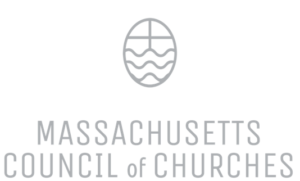As long as the Church has existed, Christians have worked to heal our divisions, not just for our own sake, but for the sake of our reconciling witness to a fractured world. The Massachusetts Council of Churches is a modern expression of this ancient commitment to unity.
Our roots go deep in Massachusetts soil. The Massachusetts Council of Churches formed from Christian institutions like the Sunday School Association and the Sabbath Protection league, efforts of Christians from a wide range of traditions to work collaboratively for the common good. The Massachusetts Federation of Churches first gathered in 1902 by Baptist, Congregationalist, Methodist and Presbyterian pastors, with ten more denominations joining by 1908.
The Massachusetts Council of Churches (MCC), under its current name, met for the first time in 1933, the result of the merger of the Massachusetts Sunday School Association and the Massachusetts Federation of Churches. At that time, the constitution of the MCC described the body’s mission this way: “The purpose of the Council shall be to further cooperation between the Christian churches of Massachusetts in interdenominational comity, religious education, social and industrial relations, and kindred matters.”
Throughout the 20th century. The Second Vatican Council greatly affected the landscape of Boston-area ecumenism because it brought the Catholic Church into dialogue with Protestant groups. The Catholic Archdiocese of Boston remains affiliated with the MCC, and occasionally collaborating on issues of mutual interest. During the 1980s, dialogue with Jewish, Muslim and evangelical groups became central to the MCC and, in 2002, membership expanded to encompass the Greek and Armenian Orthodox churches. The most recent church to join the council was the Coptic Orthodox Church, New York and New England Diocese, on October 25, 2019.
Today, the MCC is a council of eighteen denominations, committed to expressing the unity of the church in Christ and joining in common witness.

